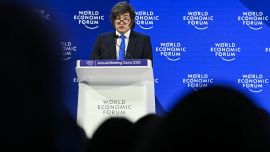Argentine populists – by which is meant the men and, in these enlightened times, women who win power by promising to give people whatever they say they want without asking themselves where all that free stuff honest folk deserve to get will come from – are fond of repeating the Radical Civic Union’s old slogan, according to which economics should always be firmly subordinated to politics. So while a populist government’s first months or even years in office may be highly enjoyable, sooner or later the money starts running out. Then it will find itself in deep trouble.
Argentines have seen this happen time and time again. From long experience, most assume that something like a consumer boom, even an extremely modest one, followed by an almighty bust is part of the natural order of things.
Mauricio Macri and most members of his government do not want to believe this. They insist they are dead set on putting an end to the downward spiral, with each successive crisis shoving another swathe of the population below a Spartan poverty line, in which the country has been trapped for the best part of a century.
There is no guarantee that they will do so but they seem determined to give it a try. For them to succeed, they must get the country to break free from the sticky web of constraints that have been spun by generations of populists determined to keep change at bay. That will be anything but easy.
The populist ‘model’ that Juan Domingo Perón devised after taking charge of the labour department of a blatantly right-wing, pro-Axis, military dictatorship turned out – much to his chagrin when the going got tough – to be a self-perpetuating political masterpiece. By pushing through some long overdue social reforms and cleverly playing on the aspirations, fears and resentments of millions of people, the founder of the Peronist movement stitched together a network of organisations that in the following decades proved more than able to resist all the many attempts to pull them apart. Trade union bosses, protectionist businessmen and the politicians who catered to their wishes made for an alliance that would continue to dominate the country for a long time to come. Though over the years the links between its components have become increasingly tenuous, it is still very much with us.
Peronism is a distinctly reactionary phenomenon but, like their counterparts in the Mexican equivalent, the ‘Institutional Revolutionary Party’ (PRI), its leaders quickly appreciated that it would be in their interest to speak the language of left-leaning progressives. In Argentina, as in Mexico, the trick worked well enough: Peronist rhetoric certainly helped stop Communism in its tracks by strongly appealing to individuals dissatisfied with the prevailing social arrangements. Abroad, the results were less impressive; as far as those Europeans and North Americans who pay attention to what is going on here are concerned, Peronism is akin to Fascism which, of course, makes it a very bad thing.
When Cristina Fernández de Kirchner ruled the roost, she and her cohorts were fully aware that their personal future would depend on the outcome of the “cultural battle” they were waging against the hosts of darkness. They understood that a victory on that particular front would allow them to get away with wrecking the economy. Had it not been for Cristina’s mishandling of the 2015 election campaign – in which she forced Daniel Scioli to accept Carlos Zannini as his runningmate and allowed an equally unappetising character, Aníbal Fernández, to be the gubernatorial candidate in Buenos Aires Province – the Kirchnerites would surely have retained power, but it was not to be.
Macri may have little in common with his predecessor in the Pink House, but he does agree with her about one thing: culture, in the anthropological sense of the word, really does hold the key. That is why he too wants to wage a “cultural battle” against the many who would much rather defend the now traditional Peronist way of doing things than have anything to do with the “modernisation” he says he has in mind. Not only panic-stricken businessmen who fear competition from unfairly efficient and inventive foreigners, trade union bosses who share their misgivings and tens of thousands of state employees who know they would not be missed were they to go home and stay there, but a great many others who share their outlook, are equally reluctant to say goodbye to the old order.
Macri faces an uphill task. Argentine society is deeply conservative. For understandable reasons, few people want to run what they feel – rightly or wrongly – would be unnecessary risks so they cling to what to them is familiar. Persuading enough of them that unless they embrace change with the appropriate fervour their own future, and that of the country, will be bleak, may not be easy but, for now at any rate, the signs are positive. By looting the country and thereby discrediting themselves, the Kirchnerites gave their foes a chance to capture the hearts and minds of millions of desperately poor people who scrape a living of sorts in Greater Buenos Aires. If the opinion polls are anything to go by, Macri’s supporters are contriving to do just that and are advancing into territories that, until quite recently, they thought were no-go zones into which they would be foolish to venture.


















Comments